SDG7: AFFORDABLE AND CLEAN ENERGY
Qassim University’s Contribution to SDG 7: Promoting Affordable and Clean Energy in Saudi Arabia
Sustainable Development Goal 7 (SDG 7) focuses on ensuring access to affordable, reliable, sustainable, and modern energy for all. In Saudi Arabia, country rich in energy resources, addressing energy affordability and transitioning to clean sources of energy is crucial for sustainable development. Qassim University recognizes the significance of SDG 7 and has taken proactive steps to contribute to the promotion of affordable and clean energy within its community and beyond.
Energy Efficiency Initiatives:
Qassim University’s commitment to SDG 7 is evident through its energy efficiency initiatives. The university implements measures to reduce energy consumption on its campus, such as upgrading lighting systems, optimizing HVAC systems, and promoting energy-saving behaviors among students and staff.
Renewable Energy Integration:
The university actively explores the integration of renewable energy sources, such as solar and wind power, into its operations. Qassim University’s efforts to harness clean energy contribute to reducing reliance on fossil fuels, lowering carbon emissions, and promoting sustainable energy practices.
Education on Sustainable Energy:
Qassim University plays a vital role in educating future professionals who will shape the energy landscape. The university offers courses and programs that cover topics related to sustainable energy sources, energy conservation, and renewable technologies. By equipping students with knowledge about clean energy, Qassim University contributes to building a skilled workforce capable of driving the transition to sustainable energy systems.
Research on Clean Energy Technologies:
The university’s commitment to SDG 7 extends to its research endeavors focused on clean energy technologies. Qassim University’s research projects explore innovative solutions for harnessing and utilizing renewable energy sources efficiently. This research contributes to advancements in clean energy technologies that can benefit the wider community.
Promotion of Energy-Saving Practices:
Qassim University promotes energy-saving practices and behavior change among students, staff, and the community. The university organizes awareness campaigns, workshops, and seminars that educate individuals about the importance of energy conservation and provide practical tips for reducing energy consumption.
Collaboration with Energy Agencies:
The university collaborates with energy agencies, research institutions, and industry partners to collectively address energy challenges and promote clean energy adoption. These collaborations facilitate knowledge exchange, technology transfer, and joint projects aimed at advancing affordable and clean energy solutions.
Demonstration Projects for Clean Energy:
Qassim University establishes demonstration projects that showcase the viability and benefits of clean energy technologies. These projects serve as practical examples for students and the community, inspiring them to consider clean energy options and contribute to a more sustainable energy future.
Sustainable Infrastructure Development:
Qassim University incorporates sustainable energy principles into its infrastructure development plans. The university considers energy-efficient design, renewable energy integration, and smart building technologies when constructing new facilities, contributing to long-term energy savings.
Qassim University’s commitment to SDG 7 is demonstrated through its proactive efforts to promote affordable and clean energy. By implementing energy efficiency measures, integrating renewable energy sources, educating students, conducting research, promoting energy-saving practices, collaborating with energy agencies, and incorporating sustainable design principles, the university actively contributes to a more sustainable energy future for Saudi Arabia. Through its dedication, Qassim University plays a crucial role in advancing the goals of SDG 7 and ensuring access to clean and affordable energy for present and future generations.
The Engineering Club at Qassim University discusses the role of solar energy in strengthening the national economy according to Vision 2030
The Engineering Club at Qassim University discusses the role of solar energy in strengthening the national economy according to Vision 2030
Information and Communication Center:
The Engineering Student Club at Qassim University at the College of Engineering
and ASME in partnership with the Saudi Council of Engineers organized a lecture entitled “The Role of Solar Energy in Enhancing the National Economy in Vision 2030”.
During his lecture, Dr. Radwan Abdul Ghani spoke about the axes on which the vision depends on a vibrant society, a prosperous economy and an ambitious homeland, and the importance of energy for the realization of the axes. This lecture came within the multiple programs held by the Student Engineering Club to raise the level of efficiency of the students of the College of Engineering and those interested in this field, and the lecture received attention from students for its importance and the information it contained showing the role of solar energy in Vision 2030.
For their part, a number of members of the Student Engineering Club confirmed that the club will continue to hold lectures that will develop the student and raise his efficiency in line with the vision of the Kingdom of Saudi Arabia 2030.
The lecture was held on the stage of the College of Engineering in the presence of more than 120 people, including the Dean of the College of Engineering, Dr. Fahad Al-Mufdi, his agents, and a number of faculty members, engineers and students.
Director of King Fahd University of Petroleum: Benefiting from the experiences of universities in developed countries Director of the Institute of Management: A new mechanism to ensure the access of qualified people to leadership positions Zamil: We have established several community partnerships in the sectors of energy, industry and communications
During the Third Symposium
Rector of King Fahd University of Petroleum: Benefiting from the experiences of universities in developed countries
Director of the Institute of Management: a new mechanism to ensure access to qualified leadership positions
Al Zamil: We have established several community partnerships in the energy, industry and telecommunications sectors
Information and Communication Center:
The third session was held following the official opening ceremony of the conference, chaired by His Highness Prince Dr. Turki bin Saud bin Mohammed Al Saud, President of King Abdulaziz City for Science and Technology, under the title “Universities and Vision 2030” and with the participation of His Excellency Dr. Mohammed bin Sulaiman Al-Jasser, former Minister of Economy and Planning, His Excellency Dr. Khalid bin Saleh Al-Sultan, Rector of King Fahd University of Petroleum and Minerals, and His Excellency Dr. Masheb bin Bin. Ayed Al Qahtani, Director General of the Institute of Public Administration, and Dr. Abdulrahman Al Zamil, Chairman of Zamil Holding Group.
Dr. Khalid bin Saleh Al-Sultan presented a working paper entitled “The Role of Saudi Universities in Activating Vision 2030, Reality and Hope”, in which he presented the experiences of universities that have been able to lead the transformation of societies and achieve the hopes of development in several developed countries, such as the contribution of the university sector to the British national product by about £40 billion in one year, in addition to providing 340,000 jobs through its various activities, where every pound sterling spent on knowledge exchange activities is achieved. In British universities, the return is estimated at 6.4 pounds, as is the case in several developed countries such as the United States of America, Switzerland, Denmark and Canada.
Al-Sultan spoke about King Fahd University of Petroleum and Minerals launching new initiatives in line with the aspirations of the vision, in addition to its existing and ongoing quality initiatives, based on promoting excellence in the preparation of national competencies and leaders, leadership in water research and technologies and environmental protection, in addition to expanding the impact of the innovation and entrepreneurship system, contributing to pioneering initiatives to the development of the national economy, building distinguished models of public education schools and developing the management of non-profit institutions, while diversifying the university’s funding system.
His research paper concluded that the implementation of the vision is important, but more importantly the availability of depth and spirit of vision, especially in universities where global practices indicate their multiplier role in achieving what the vision aspires to, focusing on measuring fundamental achievements and tangible effects more than relying on indicators and figures.
Dr. Masheb bin Ayed Al-Qahtani, Director General of the Institute of Public Administration, presented a working paper on “The Role of the Institute of Management in Achieving Vision 2030”, which is based on strengthening the role of the Institute as a distinguished house of expertise to support change and institutional and administrative development, and provide distinguished services that meet the needs of customers and achieve high levels of satisfaction, as well as the development of financial resources and raise the efficiency of spending, in addition to developing an interconnected, interactive and responsive work environment, to build motivating, capable and enabling human resources in the Institute, which contributes to increasing the interaction and impact of the Institute. Community.
He also presented the initiatives of the Institute of Management in the National Transformation Program, which are to discover and attract future administrative leaders in the government and private sectors and qualify them in accordance with international best practices, and to develop the knowledge and skills of current leaders to keep pace with the requirements of change and transformation in the administrative, economic and technical fields, in addition to developing the relevant laws and regulations to support the access of qualified people to leadership positions, and the Institute seeks to build a framework that includes organizational mechanisms that contribute to meeting the training needs of civil servants. Raise their efficiency by providing intensive training courses remotely.
Dr. Abdulrahman Al Zamil, Chairman of Zamil Holding Group, reviewed the efforts of his organization in the field of scientific research development, and the support it provides in this field, where Zamil Oasis contains a digital manufacturing laboratory through which models of scientific projects and innovations are prepared, the Mobile Scientific Exhibits Hall: which is an exhibit that is displayed every once in a while in one of the scientific fields and coordinated in cooperation with international scientific centers, in addition to the Early Education Hall: It is an integrated hall for the child where he practices the skills of scientific thinking in his various methods according to educational bags for four scientific tracks according to the STEMmethodology and specialized for early education.
Al Zamil also stressed that his holding group has held many community partnerships with many government and private entities in the field of developing scientific research, in several fields such as energy, oil, industry, aerospace, aviation, technology and communications.
HE the Chancellor: The National Industries Development Program contributes to transforming the Kingdom into a major industrial power
His Excellency Prof. Dr. Abdulrahman bin Hamad Al-Dawood , Rector of the University, stressed that the inauguration of His Highness the Crown Prince Prince Mohammed bin Salman for the National Industries Development and Logistics Program, which is one of the most important The largest programs of the Kingdom’s Vision 2030 will contribute to transforming the Kingdom into a major industrial power. It contains many industrial castles, and will make it an important stop on the world trade routes to offer Logistics, making the most of untapped natural resources and location The distinguished geographer that Allah the Almighty has given to our dear homeland.
The Rector of the University pointed out that the Custodian of the Two Holy Mosques King Salman bin Abdulaziz and His Highness the Crown Prince Al-Amin – may Allah protect them – leads this economic transformation to reach the goal of Vision 2030, which reduces Relying on oil as the Kingdom’s main source of income , focusing on a number of vital sectors Other tributaries of economic and social development are the industrial, mining and energy sectors. Logistics and raising its participation in the GDP by more than one trillion riyals And create more than a million and a half jobs and attract more investments and raise the size of Non-oil exports to exceed one trillion riyals.
He added that education and scientific research will have a major role in the development, promotion and development of the planned industries. Its establishment in the next stage, where the industry depends mainly on trained and scientifically qualified cadres In practice to operate these factories, universities will have a major role to play with the qualified cadres they will provide in Fields of science, engineering, mining and others, in addition to research and scientific studies that can contribute In the development of many industries and benefit from innovations and inventions produced by laboratories Research in the Kingdom’s universities.
Al-Daoud explained that this blessed step confirms that the Kingdom is on its way to the future. With steady pace and unrelenting determination, and that the tricks and machinations hatched by the enemies of this great homeland will not Discourage it from achieving its goals in a more prosperous, secure, stable and united future around the banner of unification, To ensure a better life for future generations in all fields, asking Allah Almighty and Allah to reconcile Leading this dear country and its sons to what is good and development and to repay their steps And make them an asset to this country and its people.
Start receiving scientific abstracts to participate in its international conference on «Prospects of solar energy in the Kingdom»
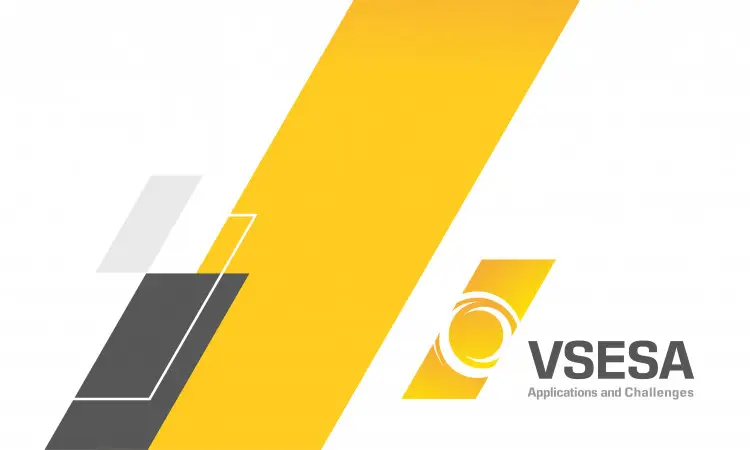

The University, represented by the College of Engineering, announced the start of receiving scientific abstracts for the international conference «Prospects of Solar Energy in the Kingdom of Saudi Arabia: Applications and Challenges», which will be held from 1-2 April 2020, and the University invited researchers wishing to participate in this international conference to send abstracts of scientific research, through the link of the conference https://events.qu.edu.sa/vsesa2020/ where abstracts are received until October 31, 2019, provided that the accepted abstracts are announced on November 15, 2019. The conference aims to invite leading academics, researchers in solar applications and industry experts in the Kingdom of Saudi Arabia and the world, to exchange experiences, challenges and results, in addition to promoting and developing promising solar energy technologies to support and achieve the Kingdom’s Vision 2030, as well as contribute to achieving the goals of the Kingdom’s Vision 2030 in diversifying the economy currently based on oil to transform the Kingdom from an advanced country in the export of oil to a sustainable energy exporter. For his part, the Chairman of the Scientific Committee of the Conference, Dr. Meshal Al-Mushaiqah, Dean of the College of Engineering, explained that this conference is being held in line with the Vision 2030 of the Kingdom of Saudi Arabia, which aims to support the national economy, reduce dependence on oil, and create awareness of the importance of solar energy as an abundant source of renewable energy in the Kingdom of Saudi Arabia, as the conference covers the current situation and developments in solar technologies and applications, for example: Thermoelectric solar energy, photovoltaic and solar architecture, noting that the conference will focus on the use of solar engineering in various applications within academia, government and industry in Saudi Arabia, drawing on previous experiences in this vital field. He added that the conference will discuss a number of axes, including the generation of electrical energy using solar energy, its storage, and desalination using water, as well as applications of solar heating and cooling, passive and active applications of solar energy on buildings, in addition to the axis of applications of solar energy in the field of transportation and management in the Kingdom of Saudi Arabia.
The university organizes an international conference to maximize the use of solar energy and its applications. Under the patronage of His Highness the Amir of Qassim
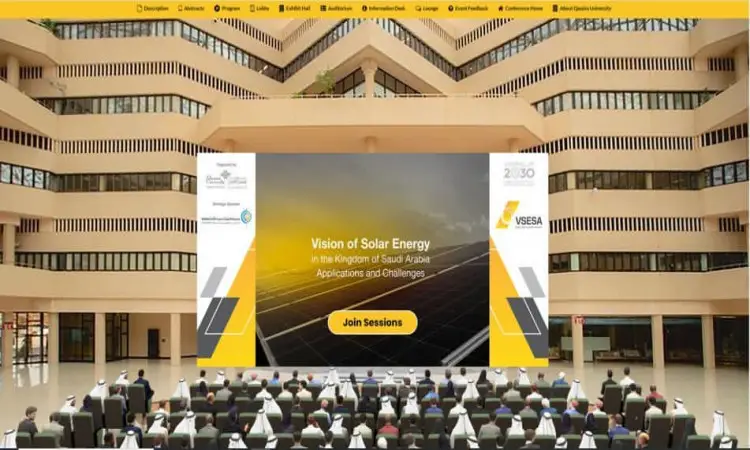
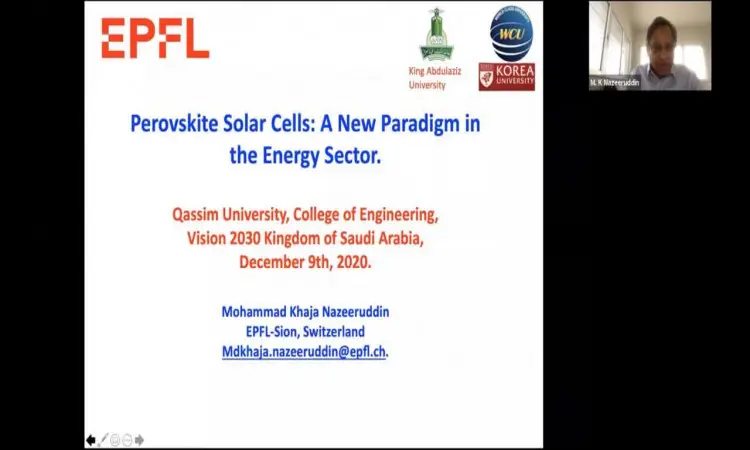
The scientific sessions of the international conference «Prospects of Solar Energy in the Kingdom of Saudi Arabia: Applications and Challenges» organized by the University, represented by the College of Engineering, on its first day on Wednesday 24/4/1442 AH, discussed a number of axes, research and scientific studies with the participation of many academics, researchers in solar applications and industry experts in the Kingdom of Saudi Arabia and the world remotely.
The first scientific sessions of the conference were held under the title “Generation of electrical energy from solar energy”, where Dr. Emad Shams presented a research paper entitled “Identifying the problem of tracking maximum solar energy using algorithms inspired by the vitality of swarms”, during which he addressed ways to track the maximum point of solar energy to make the PV system in optimal operation, taking into account costs, then Dr. Ahmed Eid talked about his paper entitled “The impact of distributed solar power generation on energy loss and voltage stability of distribution networks”. , during which he discussed the integration of solar distributed generators with distribution networks to reduce the loss of active energy and enhance voltage stability.
Afterwards, Dr. Humaid Mohammed presented a paper entitled “Evaluation of the operating conditions of the crystalline silicon PV unit for the distribution of frequencies for the city of Riyadh”, during which he stressed that the performance of the PV unit varies under the conditions of the external field and can be better analyzed using frequency distribution under different operating conditions, where the purpose of this study was to find the most common operating conditions of photovoltaic units that can be used to plan, design and scale photovoltaic power plants, as Dr. Rubmati Mina spoke about His paper, entitled “Deterioration of Crystalline Silicon PV Modules under Hot Climate Conditions”, revealed that crystalline silicon PV units are vulnerable to defects and deterioration under hot climatic conditions such as in desert areas suffering from multiple environmental pressures, overheating, and ultraviolet radiation, along with temperature and humidity changes with the ingress of gases, as these stress factors can lead to structural, thermomechanical and chemical changes within the PV unit that affect the Its electrical performance.
Dr. Manahel Mohammed then spoke with a paper entitled “Solar Energy as an Alternative to Electrical Energy in Saudi Vision 2030”, during which she addressed the knowledge of the opinion of the Saudi people on the use of solar energy as an alternative to electrical energy in homes, where the researchers applied a questionnaire containing 216 samples from different segments of society, and the questionnaire contains four parts, and when the sample was asked about the need to use renewable energy sources to generate electricity instead of generating from oil derivatives, 88.8% of the sample agreed, When asked about the most suitable source of renewables for investment in Saudi Arabia, 93% recommended solar energy, 19% of the sample use solar energy at home, and 88.9% strongly agree that the government’s contribution to subsidizing the costs of solar technologies will encourage citizens to use solar energy.
At the end of the session, Dr. Hisham Osman spoke about his paper entitled “Thermal Properties of a Parabolic Basin Complex (Comparative Study)”, during which he stressed that it has been commercially proven that parabolic basins are the most advanced of concentrated solar technologies, where operating temperatures can be achieved in the range of 350-550 ° C in parabolic basins, and solar power plants using the equivalent basin can be produced from 5 to 280 MW.
The scientific sessions of the conference continued through a session entitled “Desalination using solar energy”, where Dr. Qazi Barry, spoke about his research entitled “Solar Desalination Unit of the Porous Column Type”, in which he addressed high-quality potable water sources that have shrunk rapidly in many urban and rural areas of the world especially in the Middle East, Africa and Asia for many reasons, and the removal of salinity and impurities in raw water in any traditional way is still expensive, where he tried to remove salinity and impurities in raw water in any traditional way. One of the low-cost ways to produce distillates (distilled water) is solar desalination, after which Dr. Lotfi Kamal Azaz, for his research paper entitled “Using GIS Technologies and Multi-Criteria Analysis to Determine the Appropriate Locations for Solar Water Desalination Plants, presented a case study from Egypt”, during which he noted that water is one of the most important elements of economic development and sustainable development, and water shortages are one of the most important global issues. In Egypt, rapid population growth and economic development are increasing the demand for water, in addition to that there are some other challenges such as climate change and the construction of the Ethiopian dam, and desalination using solar cells is one of the available alternatives to water supply in Egypt especially because of its geographical location within the often dry climatic range with the highest rates of hours of solar radiation almost all year round in the world.
Hence, Dr. Zakaria Amara talked about his study entitled “Solar Distillation with a Rotary Wheel for Desalination: A Comparative Study”, during which he explained that the back wall of the distiller is untapped and through it a large thermal loss occurs, so a metal disc was installed on a horizontal column rotated by an electric motor, and the turntable is located in the middle of the back wall and this increases the evaporation area and the area of exposure to solar radiation, when the disk rotates it gets wet with a thin layer of water which helps to speed up evaporation, Dr. Abdullah Najib then spoke about his research entitled “Solar Water Desalination Using Multi-Impact Membrane Distillation: Laboratory Results” where this work dealt with the performance of the solar desalination system using the membrane distillation process, and this system consists of solar photovoltaic panels, solar thermal collectors and membrane distillation unit, the latter is based on membrane distillation with multiple effects in which thermal energy is recycled and reused in the system when the cooling in the condenser is turned on.
In turn, Dr. Abdul Qader Abdullah presented a research entitled “The Effect of Adding Trays on Solar Distillation Performance, Experimental Approach”, The productivity of solar desalination units is commensurate with the depth of water and the wet surface area inside the unit, the productivity of the unit can be increased by increasing the surface area of the aquarium, to maintain the lowest possible depth of water inside the unit We used shelves, and two desalination units were designed and manufactured, the first unit is of the traditional type and the second is modified with shelves, and the design, manufacture and experimentation work was done Research for the modified desalination unit for the purpose of improving productivity. In addition, it was designed according to safety standards, and the aim of this work is to increase freshwater productivity by some changes in the design of the unit, where we obtained an increase in the productivity of the shelving desalination unit by approximately 45% compared to the conventional unit, and the daily efficiency was 47% and 34% for the shelf desalination unit and the conventional unit respectively.
The first day of the conference concluded with a scientific session entitled “Materials Used in Solar Energy Applications”, which saw Dr. Nazik Al-Attab participate in a paper entitled “Ultra-flexible, extendable, lightweight and highly efficient silicon solar cells for the use of unmanned aerial vehicles”, where the study confirmed that the demand for unmanned aerial vehicles is increasing significantly due to their wide range of applications including, but not limited to, agricultural inspection, fire fighting and border security, as well as aircraft However, most of the solar cells currently available are either too heavy, too solid, too expensive or inefficient for drone platforms, necessitating the development of lightweight, ultra-flexible and extendable solar cells with high efficiency that can perfectly correspond to curved and folding surfaces on drones. Pilot without affecting the aerodynamics of the flight.
Introducing his paper entitled “Examining Different Types of Defects in Newly Manufactured Crystalline Silicon PV Modules”, Dr. Robmati Mina said that solar PV cells have recently become a promising renewable energy technology, and large capacities have been installed around the world, yet photovoltaic cells face many manufacturing stage defects even before actual use, and these defects not only affect the performance of cells, but are likely to cause a severe deterioration in their performance within years. Few field operation, after which Dr. Sadiq spoke about a research paper entitled “Design, manufacture and testing of low-cost flat panel complexes under the climate of central Qassim”, during which he stressed that energy is the main basis for economic, technical and social development, and with the increase in global awareness of energy challenges, solar energy has been given great attention as a promising solution to energy problems, and in this research a small solar complex with natural and low-cost rotation with a solar aperture of 0.75 was designed and manufactured. Square meters at the Faculty of Engineering in Onaiza at Qassim University, the complex was tested to heat 20 liters of water during the day in the city of Onaiza from October 18 to November 4.
At the end of the session, Dr. Mohamed Moussa presented his participation entitled “Perovskite Metal Metal Polyide AMX3 as Promising Candidate Materials for Future Solar PV Technologies”, during which he stressed that since the first appearance of solar PV cells in 1976, many scientists have made tremendous efforts to improve the performance of conventional solar PV cells and increase their efficiency, and a range of inorganic semiconductors have been used to manufacture solar PV cells, such as amorphous silicon, monocrystalline and polycrystalline silicon, and thin films. For his part, Dr. Mohammed bin Rabah spoke about his paper entitled “Silicon Nanowires for Photovoltaic Applications”, noting that chemical engraving based on silver nanoparticles represents a very modern and sophisticated method used to form nanowires (nanowires) on the surface of monocrystalline silicon chips.
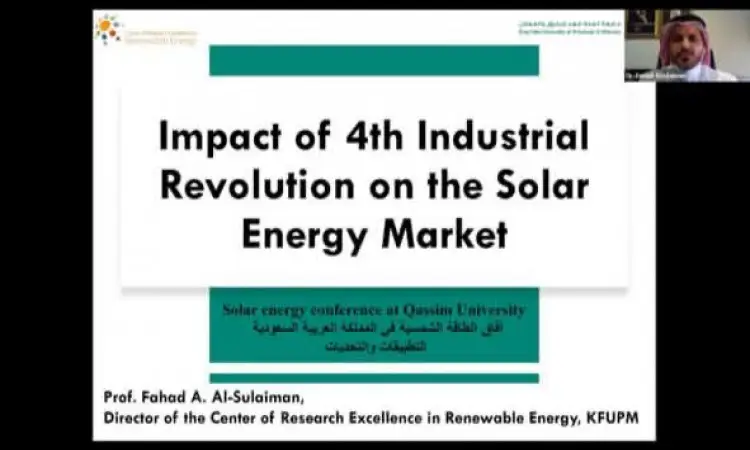
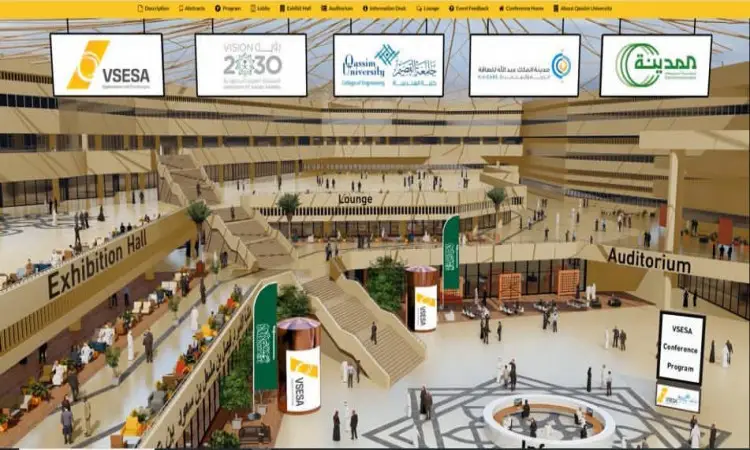
His Excellency the Rector inaugurates the First International Conference on the Sustainability of Natural Resources
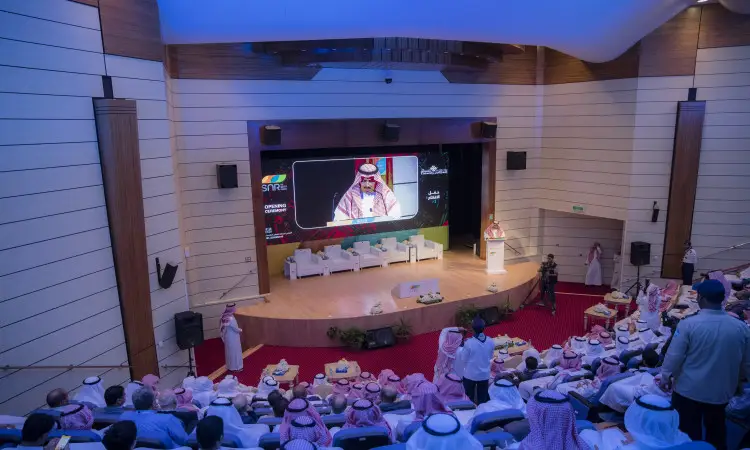
H.E. Prof. Dr. Abdulrahman bin Hamad Al-Daoud, Rector of the University, stressed that achieving environmental sustainability is one of the most important pillars of the Kingdom’s Vision 2030, in order to raise the efficiency of waste management and reduce pollution, as the Kingdom as an active member of the international system, especially in the Group of Twenty, which seeks to achieve the United Nations goals of sustainable development, pointing out that the issue of waste management is linked to a number of UN goals, including industry, innovation, infrastructure, sustainable cities, sustainable production and consumption, as well as reducing climate change.
This came during the patronage of His Excellency the Rector of the University, for the First International Conference on the Sustainability of Natural Resources: Sustainable Management of Solid Waste, which began on Tuesday morning, 8/3/1441 AH, and which is organized by the Faculty of Engineering at the University and the Center for Sustainable Development, at the headquarters of the main lobby in the University City for men, and for women in the theater of the Faculty of Economics and Management, over two days with the participation of 36 speakers to cover all the axes and objectives of this scientific meeting, which aims to discuss the necessary measures to transform into sustainable food systems.
Al-Daoud added that the university seeks to achieve sustainability through its centers, research and scientists, through a system of integration and cooperation between its units, educational and research programs, thanking the sponsors of the conference, the Qassim Municipality, and all contributing sectors inside and outside the university.
His Excellency the Rector also inaugurated the exhibition accompanying the conference, in which 6 government and private entities participate, including a corner for the Qassim Municipality, a corner for the College of Engineering, a corner for the Center for Sustainable Development, a corner for the City Cement Company, the Cleaning Machinery Factory Company Ltd., and the Fahad Company, and witnessed the signing ceremony of a memorandum of cooperation between the Faculty of Engineering at the University and the City Cement Company.
For his part, the Chairman of the Organizing Committee of the Conference, Prof. Dr. Khalid Bani Al-Harbi, Vice President for Planning, Development and Quality, spoke about the importance of this conference, which comes in harmony with the University’s sense of its strategic role in the Kingdom in general and in the region in particular, and as an embodiment of the aspirations of the Kingdom emanating from its Vision 2030, which gave great importance to the economic fields and the areas of quality of life, pointing out that the University has adopted a number of academic activities to embody this role, the most important of which is this type of scientific meetings, in addition to supporting research in This field and the inclusion of sustainability concepts in the courses of academic programs, and recently the launch of the sustainable university project supervised by His Excellency the Rector of the University and under the patronage of His Royal Highness Prince Dr. Faisal bin Meshaal bin Saud bin Abdulaziz, Amir of the region.
Al-Harbi added that the Organizing Committee has held more than 12 lengthy meetings to prepare for the conference, while the meetings of the other executive committees exceeded more than 30 working meetings, 19 of which were for the Scientific Committee, and the working hours of the preparatory team amounted to more than 150 working hours, and the working group included more than 36 members, and this work resulted in the participation of more than 15 countries with 168 participants, and more than 120 scientific papers were arbitrated.
Al-Harbi explained that the organizing committee and those in charge of this conference, which is dedicated to sustainability concept and research through participants and interested parties, decided that the conference should go beyond this to be sustainable even with an organizational printer, offering thanks and appreciation to partners for success represented by the strategic partner City Cement Company, the silver sponsor Al-Fahad Company, the supporting sponsor of the Qassim Municipality, and the parties cooperating with the conference, which comes at the forefront of which is the Ministry of Environment, Water and Agriculture represented by the Environment Agency and the Ministry’s branch in the region represented by His Excellency Eng. Salman Al-Suwaina, as well as The General Directorate of Education in the region is represented by His Excellency Mr. Saleh Al-Jasser for their constructive cooperation to make this conference a success.
After that, the Dean of the Faculty of Engineering, Dr. Meshal bin Ibrahim Al-Mushaiqah, said that the Faculty of Engineering at the University attaches great importance to the topics of sustainability of natural resources for their specialized nature, to be one of the most important arms of the University to achieve this lofty purpose next to the relevant specialized authorities from colleges and other units, the most important of which is the Center for Sustainable Development at the University, as a partner in the organization and incubator of the conference with the College in the establishment of this qualitative international forum.
He pointed out that the conference aims to show the size of natural and economic resources wasted and estimate the environmental cost of waste, as well as discuss the necessary measures to transform into sustainable food systems where waste is reduced and food waste is reduced, in addition to stimulating integration between partners from different disciplines to manage waste in a sustainable manner, studying opportunities to stimulate investment in the development of waste recycling technologies in the Kingdom, and studying the obstacles to investment in the field of waste manufacturing industries, through several axes discussed by the conference, namely: Effective management, valued food and responsible citizen, attractive and ambitious investment, and a cohesive team to protect and sustain the environment.
The organizers of the conference seek to contribute to the preparation of a vision on sustainable solid waste management at the national and global level, through the participation of a number of experts, academics and specialists from 15 countries in this field and discuss the results of the latest studies, research and scientific papers related to sustainable solid waste management through 6 sessions throughout the two days of the conference, in order to reduce the per capita consumption rates in the Kingdom of Saudi Arabia of some goods and services, which come within the highest rates globally, which increased the volume of solid waste generated, Reducing the depletion and degradation of natural resources due to high consumption rates, and transferring and localizing modern international technologies in the field of waste management in accordance with the conditions of the Kingdom.
The Dean of the College of Engineering added that the conference also seeks to address the challenges arising from waste, which is the responsibility of each member of society, raise community awareness of the risks posed by waste generation, encourage initiatives aimed at improving sustainable waste management, and provide an opportunity to exchange experiences and knowledge among specialists in waste management and sustainable development.
Hence, the speech of the sponsors was delivered by the Executive Director of City Cement, Mr. Majid bin Abdulrahman Al-Assilan, in which he stressed the existence of millions of tons of municipal waste estimated at billions of riyals, which contain organic and inorganic materials of foods and yes God love this blessed country and other materials that could have been recycled and converted into energy to achieve added value to the homeland, but unfortunately they end up in landfills, which is a kind of waste and contradicts our Islamic values and teachings. to the negative environmental impacts resulting from the backfilling of waste in the ground, some of which take more than 100 years to decompose in nature.
Al-Osailan pointed to the risks of leakage of some harmful substances from those residues to the soil and groundwater or the risk of fires, pointing out that most of the developed European countries such as Germany, the Netherlands and Belgium have a total amount of waste destined for landfills is almost zero, where no waste is backfilled and if necessary a very high fee is paid on the landfill to reduce these practices and protect the environment, by replacing the use of petroleum fuels with renewable energy and primitive fuels, offering sincere thanks and appreciation To all colleagues at the university and those in charge of this conference, for their blessed efforts and for what will contribute to achieving the directions of our wise government of raising awareness regarding the environment and sustainability, supporting coordination between the public and private sectors, and contributing to the achievement of the Kingdom’s Vision 2030 to place the Kingdom in the ranks of developed countries.
For his part, the Director of the Center for Sustainable Development, Mr. Ibrahim bin Saleh Al-Rabadi, spoke about the vision of the Center for Sustainable Development at the University for sustainability through the adoption of a balanced integrated approach to achieve equitable development between regions and generations, each takes his right and each carries out his duty towards his environment, society and economy to complete the three clusters of sustainability, and sustainability addresses the issue of waste in its physical, technical, social, technical, informatics, financial and economic dimensions.
Al-Rabadi explained that waste management is linked to a number of UN goals, especially the ninth goal, which is industry, innovation and infrastructure, the eleventh goal related to sustainable cities, the twelfth goal on sustainable production and consumption, and the thirteenth goal, which is concerned with reducing climate change, and it is hoped from this conference to seek to diagnose problems accurately and develop appropriate solutions by scientists and experts gathered, and we hope that the objectives of this conference will be achieved and its recommendations translated into useful practical projects.
The conference witnessed the presence of the Vice President of the University, Dr. Mohammed Al-Saawi, the Vice President for Educational Affairs, Dr. Mohammed Al-Odaib, the Vice President for Graduate Studies and Scientific Research, Prof. Dr. Ahmed Al-Turki, Eng. Salman Al-Suwaina, Director of the Branch of the Ministry of Environment, Water and Agriculture in Qassim, Mr. Saleh Al-Jasser, Director of the Department of Education in the Qassim Region, Eng. Abdulmohsen Al-Faraihi, Director of the Directorate of Water in Qassim, Eng. Abdulaziz Al-Saleem, Deputy Secretary of the Qassim Region, and the deans of the faculties, faculty members and students at the University.
References
[1] [Online]. Available: .https://www.qu.edu.sa/content/news/392
[2] [Online]. Available: .https://www.qu.edu.sa/content/news/413
[3] [Online]. Available: .https://www.qu.edu.sa/content/news/1135
[4] [Online]. Available: .https://www.qu.edu.sa/content/news/1444
[5] [Online]. Available: .https://www.qu.edu.sa/content/news/2389
[6] [Online]. Available: .https://www.qu.edu.sa/content/news/2395
[7] [Online]. Available: .https://www.qu.edu.sa/content/news/1531
